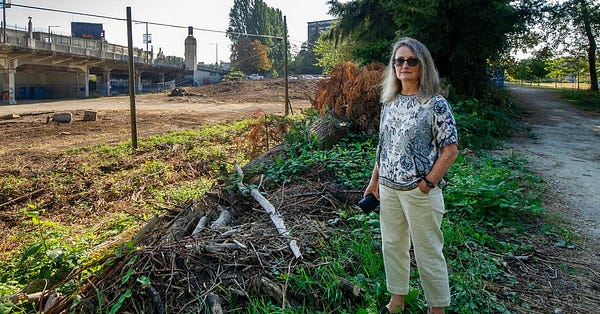Headed to Amsterdam, Singapore, and Taipei!
Plus: September inflation update, premed meritocracy, and Land Back!
For the next two weeks, I’ll be traveling — first to Amsterdam and Singapore over the next week, then in Taipei after that. Three great cities of the world. As you can probably predict, I’ll have a little to write about each one. Taipei and Singapore aren’t Tokyo, but I’ve still been thinking about this tweet as I got ready for my trip:
Anyway, if you have any recommendations — places to eat, sights to see, and so one — feel free to leave them in the comments!
Anyway, posting may be a little bit lighter than usual, as I’ll be traveling around a lot; in fact, it has already been lighter than usual for the last week or so due to me preparing for the trip. But I will do my best to keep you supplied with interesting stuff over the duration.
Today I thought I’d do another “newsletter” type post, and hit a number of topics. Let’s start with the September inflation update.
September inflation — same story as in August
The inflation numbers for last month just came out, and to be honest it’s exactly the same story as the month before. Headline inflation was very low month-over-month, due to the drop in energy prices, but still high year-over-year, due to the fact that food and energy prices increased a lot earlier this year. But core inflation, which is the main thing the Fed cares about, is still stubbornly high. Whether you measure month-over-month or year-over-year, it just keeps running at between 6% and 7%.
Every month that this continues makes the problem a little more disturbing than the last month, because every month it goes on makes core inflation look a little less likely to subside on its own due to stuff that has already happened. Thus, every month that core inflation stays at this level should raise your expectations for future interest rate hikes, because the Fed is not going to back off until this problem is fixed.
As usual, the inflation data release was accompanied by a small kerfuffle between monetary doves who are more worried about unemployment and monetary hawks who think the labor market is just going to have to suffer. The doves’ argument this time was that inflation is being driven by shelter (rent), and that since changes in rent take a long time to show up in inflation (because people sign long-term leases), we could be seeing downward price pressure on new leases that’s not yet reflected in the overall statistics. Hawks replied that median inflation, which is a good measure of broad-based price pressure, is persisting at just about the same rapid rate as in previous months, suggesting that the underlying problem is ongoing. Paul Krugman (who is usually fairly dovish) argued that shelter could still be distorting the median, while Jason Furman argued that this isn’t happening. You can read that debate here:


I would say that Furman has the stronger argument here.
Politically, inflation seems to still be really important. Yes, gas prices came down, and gas prices do seem to be a little more politically salient than other prices. But inflation still ranks as America’s top concern in polls — much higher than abortion, where GOP overreach is expected to fire up Democratic voters. So from a political standpoint, dealing with inflation seems to still be a very important task for the Biden administration. Thus, I don’t see them putting much pressure on the Fed to ease up, even though further Fed hikes do carry the risk of recession.
Premed meritocracy and its discontents
There was another outcry in the media recently about the assault on meritocracy in America. A group of premed students in an organic chemistry class at NYU put together a petition criticizing their professor, whose grades they said didn’t reflect the effort they put into the class. The professor — a prestigious researcher who actually wrote the book on the subject — was fired. Many people were outraged, arguing that this reflected entitled young Americans’ expectation that all they have to do in order to be judged successful is to show up. Some pundits, like Eric Levitz and Faye Flam, leapt to the students’ defense, arguing that “weed-out” classes for doctors are bad and lead to doctor shortages.
Debates like this are frustrating to me, because they always seem to blur the line between screening and successful instruction. If you cap the percentage of premeds who can pass o-chem at 20%, then it’s a zero-sum game — even if everyone learns the subject really well, most people end up failing. As Levitz notes, that seems like a pointless waste of talent, and strongly counter to the philosophy of abundance that I’ve been pushing for America. I suppose that medicine is an area where the case for ruthless screening makes more sense than most — when I fall unconscious on the surgeon’s table, I want to be absolutely sure that I’m going to wake up again. But America can almost certainly produce more high-quality doctors than we are producing, and health care is one of our most stubbornly overpriced services.
At the same time, it’s possible that emphasizing effort over results in education could lead to an insidious, creeping crisis of competence in America. There’s already evidence that American colleges suffer from creeping grade inflation. This is from the abstract of Denning et al. (2021):
[S]ince the 1990s, college completion rates have increased…[S]tudent characteristics, institutional resources, and institution attended do not explain much of the change. However, we show that grade inflation can explain much of the change in graduation rates. We show that GPA is a strong predictor of graduation rates and that GPAs have been rising since the 1990s. We also find that in national survey data and rich administrative data from 9 large public universities increases in college GPAs cannot be explained by student demographics, preparation, and school factors. Further, we find that at a public liberal arts college, grades have increased over time conditional on final exam performance.
Competence is about more than just showing up and doing the work assigned; it’s about figuring out how to get a good grade in a subject, or do a good job in the working world. We do not want to become a nation of automatons who robotically show up and expect to be rewarded for going through the motions.
As Levitz notes, grade inflation is probably at least in part a result of the increasing price of college. When students are high-value customers, there’s a strong incentive to do anything to please them — thus, the NYU professor was fired even though the students didn’t ask for him to be fired. A certificate that indicates competence in a subject should not be a commodity that you buy for a price; selling fake credentials like this will lead not just to a crisis of competence, but to (justifiable) class resentments as well.
Finally, one angle to this story that I haven’t seen discussed much is that the prof in question was an adjunct. In recent years, adjuncts and other non-tenured faculty have largely replaced tenured faculty as the main instructors at U.S. universities:
The NYU professor was a semi-retired researcher, but most adjuncts are not. And due to this change in the university system, most teachers are now at the mercy of students whose subjective evaluations of them is not closely connected to the quality of the instruction they receive.
That seems like a problem to me.
Land Back
On Twitter and among leftist youth, there’s a mini-movement called “Land Back”, which seeks to expunge the legacy of settler colonialism by turning over control of the land in North America and other nations over to the people they consider to be the original inhabitants. Critics of this fringe movement have pointed out that this idea is fairly indistinguishable from the irrendentist blood-and-soil nationalism beloved of the global Right. And so it is. Luckily, no one is ever going to carry out the ethnic cleansing fantasies of the leftist edgelords, so you don’t have to be worried.
But meanwhile, in the real world, there is a very interesting project that shows that giving indigenous groups greater control over the land can work the benefit of all — or at least, the benefit of most. It’s called the Sen̓áḵw (pronounced like “Snawk”) project, and it’s in Canada, which has generally been more progressive on these issues than the U.S. The city of Vancouver is basically giving the Squamish Nation 11.7 acres in the middle of the city, to do basically whatever they want. And what the Squamish Nation wants to do is to build a whole lot of really kickass dense solarpunk-style housing:





This is incredibly awesome, and it provides a model for what a real “land back” program in U.S. cities might look like. Of course, inevitably, the project has come under attack from Vancouver’s local NIMBYs, complaining there’s not enough parking:


Fortunately, the NIMBYs are likely to lose here, trumped by Canada’s progressivism on indigenous rights.
If only we could get some actual Land Back in San Francisco, instead of empty lip service.








Regarding the Maitland Jones controversy at NYU… I took two semesters of Orgo with Jones at Princeton in the ‘04-‘05 school year because I was a molecular biology major (though not pre-med). Orgo with Jones was one of the most incredible academic experiences I had in college. I probably worked harder in Orgo than in every other class put together sophomore year, but it was so incredibly rewarding (full disclosure, I fortunately got A’s both semesters). I agree that there is an important philosophical question as to whether weed-out college pre-med classes are the best way to select for medical talent. But I actually don’t think Jones was ever intending to create a pre-med weed-out class. In fact, I don’t think he gave a hoot whether his students were pre-med or not (though the majority were). He probably wanted all of them to go on to do Chemistry Ph.Ds, and was designing a class that would lead people to see beauty in chemistry as he does. His class was unique in that there were no lectures… we spent the classes solving problems in groups of four, so the style really rewarded self-starters. My experience with Jones was that he really did not suffer fools and could be a bit of a diva, but if you were self-starter and came to every class ready to participate and having done the assigned background reading in advance, he would respect you and really engage with you on the problem sets that we worked on during class. I wonder if that “suffers no fools / could be a bit of a diva” style just doesn’t work so well with the current generation of college students, in which case I feel bad for them if it means they don’t have the opportunity to learn from someone like Jones who has so much to offer.
I'm not sure that the Senakw is very scalable. I suppose the federal governments of the US and Canada could give out large loans (though I expect that would be unpopular very quickly), but the reason the Squamish Nation was able to consider this project at all is because they are extremely rich. The Tulalip Tribes might be able to do something similar in Seattle (but they might not have a strong claim to the land if the Dwamish become recognized), but I think that's about as far as it goes for tribes that are in a position to do this if they were to be given city center land to do with as they wished